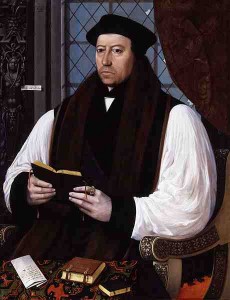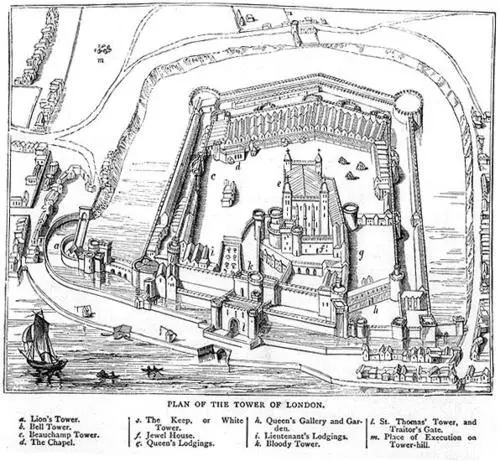
On this day in history, 3rd May 1536, Archbishop Thomas Cranmer, wrote a letter to King Henry VIII showing his shock and amazement at the arrest of his patron Anne Boleyn:-
“Have come to Lambeth, according to Mr. Secretary’s letters, to know your Grace’s pleasure. Dare not, contrary to the said letters, presume to come to your presence, but of my bounden duty I beg you “somewhat to suppress the deep sorrows of your Grace’s heart,” and take adversity patiently. Cannot deny that you have great causes of heaviness, and that your honor is highly touched. God never sent you a like trial; but if He find you no less patient and thankful than when all things succeeded to your wish, I suppose you never did thing more acceptable to Him. You will give Him occasion to increase His benefits, as He did to Job.
If the reports of the Queen be true, they are only to her dishonor, not yours. I am clean amazed, for I had never better opinion of woman; but I think your Highness would not have gone so far if she had not been culpable. I was most bound to her of all creatures living, and therefore beg that I may, with your Grace’s favor, wish and pray that she may declare herself innocent. Yet if she be found guilty, I repute him not a faithful subject who would not wish her punished without mercy. “And as I loved her not a little for the love which I judged her to bear towards God and His Gospel, so if she be proved culpable there is not one that loveth God and His Gospel that ever will favor her, but must hate her above all other; and the more they favor the Gospel the more they will hate her, for then there was never creature in our time that so much slandered the Gospel; and God hath sent her this punishment for that she feignedly hath professed his Gospel in her mouth and not in heart and deed.” And though she have so offended, yet God has shown His goodness towards your Grace and never offended you. “But your Grace, I am sure, knowledgeth that you have offended Him.” I trust, therefore, you will bear no less zeal to the Gospel than you did before, as your favor to the Gospel was not led by affection to her. Lambeth, 3 May.
Since writing, my lords Chancellor, Oxford, Sussex, and my Lord Chamberlain of your Grace’s house, sent for me to come to the Star Chamber, and there declared to me such things as you wished to make me privy to. For this I am much bounden to your Grace. They will report our conference. I am sorry such faults can be proved against the Queen as they report.”1
From this letter we can see Cramner’s shock at the events unravelling around him but he is careful in his support of Anne. Whilst supporting her by saying that he “had never better opinion of woman”, that he was “most bound to her of all creatures living” and that he was praying that she would show herself to be innocent, he also tempers this support of her by showing his allegiance to the King above all else. Cranmer’s zeal for reform, and probably fear for his life, stop him from giving Anne Boleyn, the woman who helped to make him Archbishop of Canterbury, his full, unswerving support.
Anne Implicates Norris and Weston
In the same letter I quoted from yesterday, Kingston’s letter to Cromwell on the 3rd May 1536, Kingston reports Anne Boleyn’s ramblings in the Tower as she tried to figure out why Norris had been arrested and what could have led to her own arrest. The letter was damaged by a fire in 1731, hence the missing bits:-
“and thys mornyng dyd talke with Mestrys Co[fyn. And she said, Mr. Norr]es dyd say on Sunday last unto the Quenes am[ner [almoner] that he would s]vere for the Quene that she was a gud woman. [And then said Mrs.] Cofyn, Madam, Why shuld ther be hony seche maters [spoken of? Marry,] sayd she, I bad hym do so: for I asked hym why he [did not go through with] hys maryage, and he made ansure he wold tary [a time. Then I said, Y]ou loke for ded men’s showys, for yf owth ca[m to the King but good], you would loke to have me. And he sayd yf he [should have any such thought] he wold hys hed war of.”2
and later in the same letter:-
“Sir, syns the makynge of thys letter the Quene spake of Wes[ton, saying that she] had spoke to hym bycause he did love hyr kynswoman [Mrs. Skelton, and] sayd he loved not hys wyf, and he made ansere to hyr [again that h]e loved wone in hyr howse better then them bothe. And [the Queen said, Who is] that? It ys yourself. And then she defyed hym, as [she said to me]. Will’m Kyngston.”3
I know some of you find this old English hard to understand, particularly when bits are missing so here is a translation/paraphrase:-
“and this morning she talked with Mistress Coffin. And she said that Mr Norris had sworn an oath to the Queen’s almoner that she was a good woman. Then Mrs Coffin said, “Why should such matters be spoken of?” and she replied that she had ordered him to do so: ” because I asked him why he did not go through with his marriage and he replied that he would tarry a time. Then I said “you look for dead men’s shoes, for if aught come to the King but good, you would look to have me” and he said if he should have any such thought then he would his head were off (then his head would be cut off.”
“Sir, since the writing of this letter the Queen has spoken of Weston, saying that she had spoken to him because her lover her cousin Miss Shelton and did not love his wife. He answered that he loved one in her house better than both of them and the Queen said “Who is that?”, “It is yourself”, and then she defied him, as she said to me. William Kingston.”
Henry Norris was already imprisoned in the Tower but these words spoken by Anne may have been responsible for the arrest of Sir Francis Weston the next day.

Archbishop Cranmer and Anne Boleyn
Archbishop Thomas Cranmer owed Anne and her family a huge amount. Alison Weir writes of how he had been the Boleyn family chaplain4 and his appointment to Archbishop owed much to Anne’s patronage and their shared beliefs.
Although the first part of his letter shows his shock at Anne Boleyn’s arrest, he is cautious in his support of her, and his postscript shows that he was easily convinced of her guilt in a meeting in the Star Chamber. It is easy for us to look at the words written by Archbishop Cranmer in defence of Anne Boleyn, and his subsequent actions and see him as a spineless man who let an innocent woman and five innocent men go to their deaths without supporting them one little bit. His subsequent actions did not support Anne – he helped the King find legal reasons for the marriage to be annulled while acting as Anne’s confessor, and he visited her on the 16th May to obtain from her an admission that there had been an impediment to her marriage to the King and her consent to the annulment of the marriage and “the disinheriting and bastardising of her child.”5. Alison Weir writes of how Cranmer was probably instructed to offer Anne some kind of deal in order to get her agreement – either a more merciful death by the sword or the hope of a pardon. Kingston’s report to Cromwell on the 16th reported “Yet this day at dinner the Queen said she would go to “anonre” (a nunnery), and is in hope of life.”6 This implies that Cranmer offered her some hope and that perhaps offered her the chance to escape death and enter a nunnery if she agreed to the annulment.
Spineless maybe, but we cannot judge him. He was a man running scared, he had been raised by Anne Boleyn, he had been friends with Anne and her family, he had close ties to the Boleyn faction and he must have had many sleepless nights wondering if he would be brought down too. He had to obey the King, or risk losing his head, and we can only imagine the emotional pain he felt at misleading the Queen, or perhaps he was misled too. So sad that it was Anne’s friend who had a hand in annulling her marriage and bastardising Elizabeth but how many of us could hand on heart say that we would be prepared to sacrifice ourselves for a friend?
Notes and Sources
1 – L&P x. 792 – 3rd May 1536, letter from Cranmer to the King, I have highlighted the bits that show his support of Anne.
2 – L&P x. 793 – 3rd May 1536, letter from Sir William Kingston to Cromwell
3 – Ibid.
4 – The Lady in the Tower: The Fall of Anne Boleyn, Alison Weir, p147
5 – The Lady in the Tower: The Fall of Anne Boleyn, Alison Weir, p234
6 – L&P x. 890 16th May 1536, letter from Sir William Kingston to Cromwell